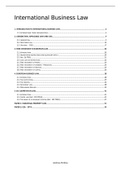International Business Law
1. INTRODUCTION TO INTERNATIONAL BUSINESS LAW..................................................................................2
1.1. INTERNATIONAL TRADE ORGANIZATIONS.................................................................................................................4
2. JURISDICTION, APPLICABLE LAW AND CISG................................................................................................9
2.1. JURISDICTION.....................................................................................................................................................9
2.2. APPLICABLE LAW..............................................................................................................................................13
2.3. UNCITRAL – CISG............................................................................................................................................17
3. FREE MOVEMENT IN EUROPEAN LAW...................................................................................................... 20
3.1. INTRODUCTION................................................................................................................................................20
3.2. QUANTITATIVE RESTRICTIONS AND EQUIVALENT EFFECT...........................................................................................20
3.3. ART. 36 TFEU................................................................................................................................................21
3.4. CASE LAW ON RESTRICTIONS...............................................................................................................................22
3.5. FREE MOVEMENT OF PEOPLE..............................................................................................................................23
3.6. FREE MOVEMENT OF WORKERS - MIGRATION.......................................................................................................24
3.7. FREE MOVEMENT OF SERVICES............................................................................................................................25
3.8. FREE MOVEMENT OF CAPITAL.............................................................................................................................26
4. EUROPEAN BUSINESS LAW....................................................................................................................... 28
4.1. INTRODUCTION................................................................................................................................................28
4.2. THE INSTITUTIONS............................................................................................................................................29
4.3. THE TREATIES...................................................................................................................................................32
4.4. SECONDARY LAW..............................................................................................................................................38
4.5. PRELIMINARY RULINGS......................................................................................................................................39
5. EU COMPETITION LAW............................................................................................................................. 41
5.1. INTRODUCTION................................................................................................................................................41
5.2. CARTEL LAW (ART. 101 TFEU)..........................................................................................................................41
5.3. THE ABUSE OF A DOMINANT POSITION (ART. 102 TFEU).......................................................................................47
PAPER 1: INDUSTRIAL PROPERTY LAW......................................................................................................... 51
PAPER 2: EEA – EFTA.................................................................................................................................... 54
Andreas Perdieu
,1. Introduction to International Business Law
Intro;
International law is agreed by two or more states and is applicable to those states and their subjects.
IBL includes a broad range of domains, including war, diplomacy, trade, and human rights.
International law aims at the practice of stable, consistent, and organized international relations.
International law can be divided in
o International Public law
Set up of international institutions
Focus on human rights
Extradition (= uitlevering) of people
Info;
International law differs from state-based legal systems in that it is primarily, though not exclusively,
applicable to countries, rather than to individuals, and operates largely through consent, since there is no
universally accepted authority to enforce it upon sovereign states. Consequently, states may choose to not
abide by international law, and even to break a treaty. However, such violations, particularly of customary
international law and peremptory norms (jus cogens), can be met with coercive action (=
dwangmaatregelen), ranging from military intervention to diplomatic and economic pressure.
o International Private law
Aim = to solve problems in international legal relationships which arise
from different legal systems
o Which country has jurisdiction in case of litigation on each
international legal status?
o Which law will be applied to each international situation?
o What are the solutions to legal problems arising out of an
international legal relationship?
Definition – International Business;
International business refers to the trade of goods, services, technology, capital and/or knowledge
across national borders and at a global or transnational scale. It involves cross-border transactions of
goods and services between two or more countries. Transactions of economic resources include
2
,capital, skills, and people for the purpose of the international production of physical goods and
services such as finance, banking, insurance, and construction.
3
, 1.1. International trade organizations
The World Trade Organization (WTO)
o Goals
Liberalizing trade by dealing with the rules of trade between nations
Improving welfare of the people of member countries
Helping trade flow smoothly, freely, fairly and predictably by;
Administering trade agreements
Acting as a forum for trade negotiations (agriculture negotiations*)
Settling trade disputes (Russian Federation*)
Reviewing national trade policies (Trade Policy Review Mechanism)
Assisting developing countries in trade policy issues, through
technical assistance and training programs
Cooperating with other international organizations
Info – Agriculture negotiations;
The broad objective of the agriculture negotiations is to reduce distortions in agricultural trade
caused by high tariffs and other barriers and domestic support measures as well as export subsidies
and equivalent measures and export restrictions.
Info – Russian federation;
The EU requested consultations with the Russian Federation regarding various measures they took
favoring domestic products and services over foreign ones.
o History: From GATT WTO
Idea: create a third organization besides the Bretton Woods institutions, the
world bank and the IMF to handle the trade side of international economic
cooperation
Draft charter (= International Trade Organization) was too ambitious
Included not only trade issues, but also rules on employment,
commodity agreements, restrictive business practices, …
Was agreed in Havana (aka Havana charter) but was declared dead
when the USA stepped out.
GATT continued as the only multilateral instrument governing
international trade until the WTO was established in 1995
o 1948 – 1994: GATT was a provisional agreement and an
unofficial international organization
o Today: GATT still exists as the WTO’s umbrella treaty
(= verdrag) for trade in goods
4




